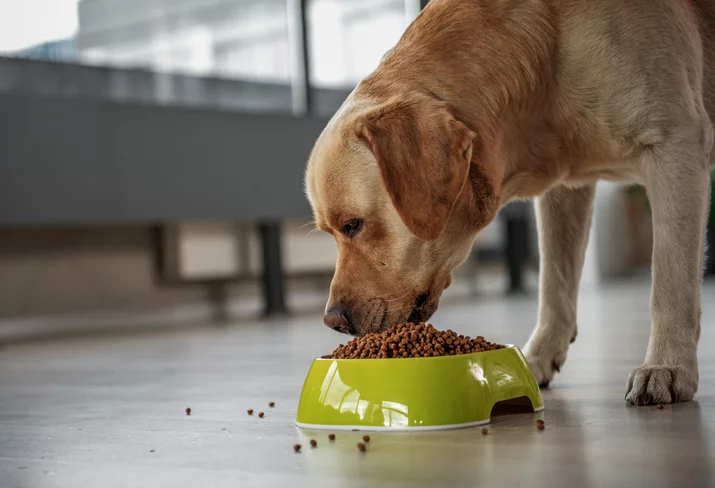Obesity in Dogs: Symptoms, Causes, and Treatments in Warrick County, IN
Obesity is dogs can cause serious complications for a dog’s health. This condition can be more common in aging pets, but it can also impact younger animals that are not being fed the right food or offered the chance to be active during the day. There are many reasons that your dog might gain weight as well, which are often linked with health conditions that need to be treated to bring your dog’s weight back under control.
Knowing more about the symptoms, causes, and treatments that can be used to take care of a dog’s obesity problem is important. Owners of pets need to be aware of what their dog’s healthy weight should be and attempt to get to the root of the problem if their dog is gaining a lot of weight. You will be able to use this guide to help you to learn more about obesity in dogs in Warrick County, what causes it, and how it can be treated.

Symptoms
The most obvious symptom of obesity in dogs is rapid weight gain. However, dogs can become obese slowly over time as well. If your dog shows these other symptoms, they are likely to be obese:
- Little to no visible waistline
- You cannot feel their ribcage
- Excess body fat that shows up in strange places as “fat packs”
- Distended-appearing abdomen
- A lack of grooming
- Lack of mobility
- Lethargy
- Difficulty in breathing
Causes
Listed below are the main causes of this condition:
Overfeeding
Dog owners love their dogs, and it can be hard not to give in when your dog is looking at your sweetly and asking for more dog treats. It is also really easy to think that the recommended feeding amount for your dog’s kibble cannot possibly be enough food for them each day. Dog owners can sometimes overfeed their pets on a daily basis and cause obesity in their pet just because they are being too kind to them.
Another common culprit is feeding human food, which is loaded with substances that dogs cannot digest. Both of these kinds of owner behavior should be avoided to prevent dog obesity and the surrounding complications it can cause.
Health Conditions
There are various health conditions that can cause obesity in dogs. Arthritis, as well as aging, can limit your dog’s ability to play or even walk around, leading to weight gain. Conditions that impact the thyroid commonly cause obesity and diseases like Cushing’s Syndrome can also lead to your dog becoming obese. All of these health conditions can be managed to some degree with the help of your vet.
Along with the medications and supportive care that your vet can offer to your dog, you will also need to reduce your dog’s food to help them to lose some weight. Most dog food brands will offer you feeding suggestions for a dog that is sedentary as well as a dog that is active. You should cut back to the maintenance or elderly dog feeding suggestion and then adjust as needed if your pet gets back to a normal weight.
Surgery
Surgical interventions can lead to your dog lying around while they heal, which can mean that they might gain weight. Just like in people, activity has to be limited for a period after surgery, and if this period is long enough, your dog might put on some extra pounds. This is another instance where it is essential to cut back your dog’s food in keeping with their activity level and then adjust back to a normal feeding plan as needed.
Sometimes neutering and spaying can lead to hormonal shifts that cause a pet to gain weight as well. This change will likely become the new norm, so you will need to adjust your dog’s feeding routine to match their new hormone levels.
Treatment
The most obvious treatment, in most cases, is to cut back on your pet’s food intake. This can resolve cases where owner behavior is the reason for a dog’s obesity, and it can help a pet adjust to changes that happen due to age or other conditions that might impact their ability to be active. Reducing the amount of food that a dog is eating and ceasing to feed treats and human foods is always a good idea when dealing with dog obesity.
Your veterinarian might also give you a prescription for a specific type of food that is targeted at a balanced diet for your pet’s health challenges. This might be a more diet-friendly kind of food, or it could be a dog food that is correctly balanced for pets that have thyroid issues, kidney problems, or other health challenges.
You will likely also be directed to increase your dog’s activity level in keeping with their health and well-being. If your dog has severe arthritis, maybe they can’t play hard anymore, but they can walk gently. If your dog is recovering from surgery, maybe they can only walk a little, but you should not skip these trips out the door to move around. Just as in people, dogs need to maintain some level of activity to be healthy.
Contact Warrick Veterinary Clinic for Obesity in Dogs
Whatever the reason for your dog’s obesity, it is always a good idea to address this problem as soon as possible. Obesity can put a strain on your dog’s joints, their heart and lungs, and their digestive processes. Your vet might need to be involved in diagnosing any underlying conditions that are causing your dog to gain weight and to help you to make a better feeding plan for your pet.
Always be sure that you do not feed your dog too many treats each day, and never feed human foods to your dog. Your dog might make you feel bad for leaving them out of your dinnertime plans, but their health will be much better because you have exercised this restraint.
For more information, or if you would like to schedule an appointment, contact Warrick Veterinary Clinic. We provide compassionate veterinary care and will be there for you and your pet.
